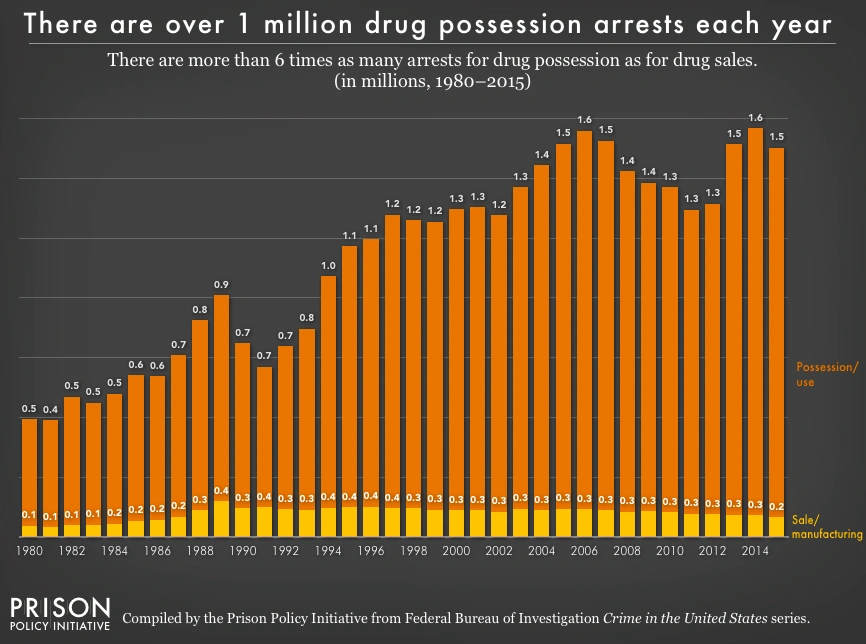The False Dichotomy of Drug Testing to Receive Welfare: Part 1
Should people be drug tested to receive welfare? This debate is fairly old and worn out. And as with most debatable issues, people have already made up their minds. However, whenever I see people discussing this issue, I always think that it's the wrong discussion to be having. Rather than discussing whether or not those receiving welfare should be drug tested, we should be discussing why drugs are illegal in the first place.
The short answer is because of the Controlled Substances Act of 1970. This is the law that criminalized the possession of various drugs and created a "scheduling" system which attempts to rank drugs based on a few factors such as medicinal quality and potential for abuse, psychological, or physical harm. Now if you're a libertarian, the sheer criminalization of these drugs in the first place is enough to make you cringe at the blatant infringement of individual liberties.
But all ideological arguments aside, the logic behind the scheduling and continued criminalization seems...non-existent. To start, why is marijuana, LSD, and psilocybin (magic mushrooms) illegal when tobacco products and alcohol remain legal? Drugpolicy.org states that LSD and psilocybin (like most psychedelic drugs) are not addictive whereas it's common knowledge that tobacco products and alcohol are addictive. Furthermore, marijuana, LSD, and psilocybin are far less dangerous to one's health than tobacco and alcohol. The CDC reports that smoking is responsible for 480,000 deaths per year in the U.S., while alcohol is responsible for about 88,000 deaths per year. On the other hand marijuana, LSD, and psilocybin-related deaths are so uncommon that I had trouble finding a number to use for this post.
Driving while stoned, despite it being considerably safer than driving while drunk, is a terrible idea. Drugabuse.com states that driving while under the influence of marijuana increases the chances of an accident by 83%, while driving under the influence of alcohol increases the probability of an accident by 2,200%. With that being said, please do not drive under the influence of alcohol, marijuana, or any other intoxicant.
The scheduling of these drugs is also nonsensical. According to the DEA's scheduling, marijuana, LSD, and psilocybin are considered to be as addictive and possibly as psychological and/or physically harming as heroin, and considered to be more addictive and psychological and/or physically harming than cocaine, meth, or fentanyl.
Schedule I drugs like marijuana, LSD, psilocybin, and MDMA (ecstasy) are also considered to have no medicinal properties. This is interesting considering that 33 states in the U.S. have legalized medicinal marijuana (with 11 states having legalized recreational marijuana.) The Multidisciplinary Association for Psychedelic Studies (MAPS), John Hopkins, and other organizations have conducted studies that show psychedelic drugs like LSD, psilocybin, and MDMA can be used in treating health issues like PTSD, anxiety, and smoking cessation. I'll talk about these more in depth in a follow-up post to this one.
Criminalization of drug possession in addition to Reagan's War on Drugs has contributed to the U.S. having the highest incarceration rate in the world. Drugpolicy.org reports that the U.S. is home to 25% of the world's incarcerated population, despite having less than 5% of the world's population.

The graph above demonstrates how the War on Drugs has caused the number of drug possession arrests to nearly triple over the past 4 decades.
This criminalization also served as way to continue the systematic oppression of the Black and Latino population in the U.S.
This criminalization snowballs into other negative effects like criminal records that make it difficult for convicts to get jobs, or students to receive financial aid.
What's the best response to drug epidemics? In my next post I'll talk more about the medicinal potential of certain drugs as well as the topic of treatment vs. incarceration. But for now, I wonder why the U.S. hasn't learned from its failed prohibition of alcohol.